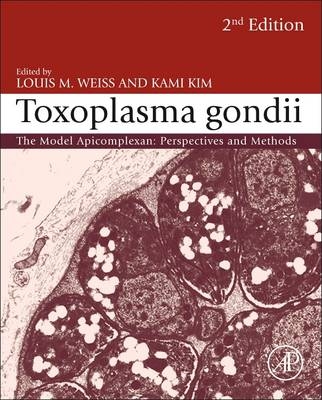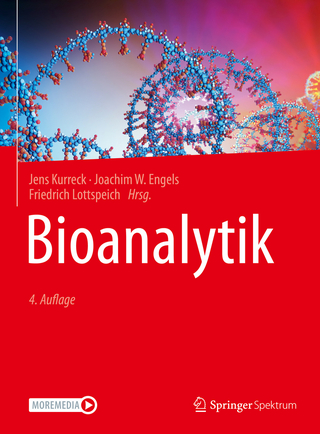
Toxoplasma Gondii
Academic Press Inc (Verlag)
978-0-12-396481-6 (ISBN)
- Titel erscheint in neuer Auflage
- Artikel merken
This 2e of Toxoplasma gondii reflects the significant advances in the field in the last 5 years, including new information on the genomics, epigenomics and proteomics of T. gondii as well as a new understanding of the population biology and genetic diversity of this organism. T. gondii remains the best model system for studying the entire Apicomplexa group of protozoans, which includes Malaria, making this new edition essential for a broad group of researchers and scientists.
Toxoplasmosis is caused by a one-celled protozoan parasite known as T. gondii. The infection produces a wide range of clinical syndromes in humans, land and sea mammals, and various bird species. Most humans contract toxoplasmosis by eating contaminated, raw or undercooked meat (particularly pork), vegetables, or milk products; by coming into contact with the T. gondii eggs from cat feces; or by drinking contaminated water. The parasite damages the ocular and central nervous systems, causing behavioral and personality alterations as well as fatal necrotizing encephalitis. It is especially dangerous for the fetus of an infected pregnant woman and for individuals with compromised immune systems, such as HIV-infected patients.
Louis M. Weiss M.D., M.P.H is Professor of Medicine (Division of Infectious Diseases) and Professor of Pathology (Division of Parasitology and Tropical Medicine) of the Albert Einstein College of Medicine, Bronx, New York. Dr. Weiss received his M.D. and M.P.H degrees from the Johns Hopkins University in 1982. He then completed a residency in Internal Medicine at the University of Chicago and a fellowship in Infectious Diseases at the Albert Einstein College of Medicine. Following this fellowship, he joined the faculty at Einstein where he is currently a Professor of Pathology and Medicine. His laboratory group has an active research program on parasitic diseases with a research focus on Toxoplasma gondii, the Microsporidia and Trypanosoma cruzi. Dr. Weiss is the author of over 200 publications and the editor of 3 books on parasitology. He is a fellow of the American College of Physicians, Infectious Disease Society of America and the American Academy of Microbiology. Dr. Weiss is the Co-Director of the Einstein Global Health Center.
Preface 1. The History and Life Cycle of Toxoplasma gondii 2. The Ultrastructure of Toxoplasma gondii 3. Population Structure and Epidemiology of Toxoplasma gondii 4. Toxoplasma Clinical Disease and Diagnostics 5. Ocular Disease 6. Toxoplasmosis in Wild and Domestic Animals 7. Toxoplasma Animal Models and Therapeutics 8. Biochemistry, Lipids, Glycobiology and Metabolism of Toxoplasma gondii 9. The Apicoplast and Mitochondrion of Toxoplasma gondii 10. Calcium Storage and Homeostasis in Toxoplasma gondii 11. The Parasitophorous Vacuole: an organelle for the host pathogen interface 12. Toxoplasma Secretory Organelles: Rhoptries, Micronemes and Dense Granules 13. The Cytoskelton: Structure and Motility 14. Alterations in Host Cell Biology due to Toxoplasma gondii 15. Bradyzoite Development 16. Development and Application of Classical Genetics in Toxoplasma gondii 17. Genetic Manipulation 18. Gene Regulation and Epigenomics 19. Genomic Analysis and Bioinformatics 20. Comparative Aspects of Nucleotide and Amino Acid Metabolism in Toxoplasma gondii and other Apicomplexa 21. Chemical Biology and Toxoplasma as a Model System for Drug Discovery 22. Proteomics of Toxoplasma gondii 23. Cerebral Toxoplasmosis: Pathogenesis, Host Resistance and Behavioural Consequences 24. Innate Immunity in Toxoplasma Infection 25. Adaptive Immunity and host Genetics 26. Toxoplasma gondii vaccines Epilogue: Toxoplasma as a Model Organism
| Erscheint lt. Verlag | 21.8.2013 |
|---|---|
| Verlagsort | San Diego |
| Sprache | englisch |
| Maße | 191 x 235 mm |
| Gewicht | 2360 g |
| Themenwelt | Medizin / Pharmazie ► Medizinische Fachgebiete |
| Naturwissenschaften ► Biologie ► Mikrobiologie / Immunologie | |
| Naturwissenschaften ► Biologie ► Zoologie | |
| ISBN-10 | 0-12-396481-4 / 0123964814 |
| ISBN-13 | 978-0-12-396481-6 / 9780123964816 |
| Zustand | Neuware |
| Haben Sie eine Frage zum Produkt? |
aus dem Bereich



